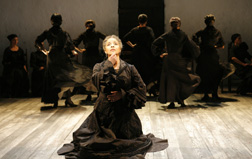
Lucy Komisar
 |
| Phylicia Rashad and company in "Bernarda Alba" |
"Bernarda Alba."
Book, music, and lyrics by Michael John LaChiusa. Directed and choreographed
by Graciela Daniele.
Mitzi Newhouse Theater at Lincoln Center, 150 W. 65 St.
Opened March 6, 2006.
Reviewed by Lucy Komisar March 8, 2006.
Closes April 9, 2006
212-239-6200.
http://www.lct.org.
Michael John LaChiusa's attempt to turn Federico Garcia Lorca's powerful 1936 feminist play, "The House of Bernarda Alba," into a chamber opera is interesting but in the end not altogether successful. His often atonal music is bright, strong, and affecting. Christopher Barreca has created a stark, effective set – a backdrop of white stucco wall and a collection of Spanish ladder-back chairs that are moved around by the actors as dancers would use props -- one moment church pews and another a window. But the women, dressed in swirls of black, inhabit a script that lacks the subtlety and drama of Garcia Lorca's work.
An adaptation doesn't have to mirror the original, but it should not diminish its power. LaChiusa takes Garcia Lorca's attack on convention, patriarchy and the oppression of women and turns it into a work about young women lusting after men and sex.
Garcia Lorca wrote a political play. Spain's greatest playwright since the "Golden Age," he was one of an early generation of "desaparecidos." He was an antifascist who denounced the rule of dictator Francisco Franco and in 1936, the year he wrote the play, was arrested and presumably murdered by Franco's security forces. He was 38 years old.
In Garcia Lorca's work, the tyrannical, class-conscious newly widowed Bernarda Alba (Phylicia Rashad) has restricted her daughters to home, unwed, because she thinks no one in the small town is good enough for them. His attack on the imprisoning effects of convention included that of mourning customs that virtually locked up female survivors. That does not come across in LaChiusa's text. There is a passing reference to the fact that Bernarda prevented a suitor from visiting Martirio (Daphne Rubin-Vega), who wears a foot brace from polio, because his family wasn't good enough. But one doesn't realize that the daughters are not allowed to leave the house. In fact, in one case, several do go out for a walk.
There's plenty of grist for feminists here. Bernarda tells her daughters that the order of things is "needle and thread for female; the mule and the whip for males." One young woman relates that a local man won't let his fiancée leave the house. Villagers drag a woman out of her house and beat her (in Garcia's version, to death) after finding the body of an infant she had out of wedlock. Poncia (Candy Buckley), the servant, tells the sisters, "Fifteen days after the wedding, the man leaves the bed for the table and the table for the tavern."
In Garcia Lorca's play, the five sisters are stifled, miserable. The oldest, Angustias (here, Saundra Santiago), whose name means anguish, is a pinched woman of 39. She has an inheritance from her father, Bernarda's first husband. Her sisters are from the second marriage. A local man, Pepe, 25, woos her for her money, but carries on a secret affair with the younger Adela (Nikki M. James). A few other sisters also have eyes for Pepe, and in the original, they turn against each other out of the frustration of their lives and their competition for men.
But writer LaChiusa and director Graciela Daniele downplay the political feminism of the play, while concentrating on sex. The sisters are jealous of each other, fighting over Pepe. However, one doesn't get the impression they see him as a ticket out of their home/prison, but as a way to get sex. Adela says she wants to feed the fire between her legs, on her lips, on her tongue.
Rashad must hold the play together as the tyrannical matriarch, who, though cheated on by her late husband, still gives him the reverence demanded by society. But you don't believe her in that role. It is jarring to hear her speak lines with a trace of black accent. That works on TV sitcoms, but not in a theater where she's playing a woman of 1930s Spain. She also lacks the range required to express emotion without simply raising her voice.
The best number in the play is the sisters' "Love, Let Me Sing You," a satire on what men tell women. The best singer is Sally Murphy, whose sunny soprano sets a halo around Amelia. The acting plaudits go to Daphne Rubin-Vega who splendidly displays the half-suppressed anguish of the "ugly" sister, Martirio. You get the sense that she is the only sister who really knows what is going on.
Candy Buckley asserts her presence as the servant Poncia. She is clearly, intrinsically, a better woman than her mistress and the person who sees things most clearly, having spent "30 years of living under Bernarda Alba's lies." Perhaps she is the alter ego for Garcia Lorca.
The use of flamenco dancers as a stallion chasing and a mare escaping sex – symbols, of course, of men and women -- is gimmicky and jarring.
In this play Adela seems to commits suicide out of desperation at losing her love. In Garcia Lorca's work, she takes her life, because she feels that she has been condemned to a living death. The difference is subtle, but profound. This production is Garcia Lorca "lite." [Komisar]